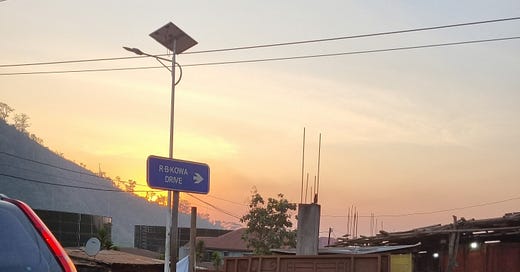Belonging: Personal Community
Being dual heritage and a part of the African diaspora: What does it mean to be a minority within a minority?
This is the preview of this month’s edition of TTB+, subscribe to the paid community to access the full post.
Abstract
The topic of personal community has been on my mind a lot lately.
Whether its in-person connection, through networking, or a virtual community like Substack, I started to really reflect on the depth of connection behind my community.
What inspired me to write this post though?
Born in England, my ethnicity is a mix between two small countries in West Africa: Sierra Leone and Gambia.
I can count on both hands how many people my age outside of my family that I know of from both countries combined, and say not all fingers will be lifted.
The question that will premise this post is:
How much does this help or hinder me?
I also encourage you to reflect on your types of community and the strength of them, as well as asking yourself whether you see the value in it or if you’re taking it for granted.
Discussion
“It could be our history that brings us together, but our culture that has the potential to bring us apart.”
There are certain experiences I wouldn’t be able to relate to within my community, but there are also unique experiences I can make for myself.
For the most part an outsider in aspects of other African cultures, but still part of the African community - a strong and powerful one brought together via common experience: historical and present.
Despite this, these ties are more challenging for me to build as compared to most of my friends.
Once I meet someone from either of the countries I’m from, we click.
Immediately.
There’s an instant understanding between us and it seems as if we could talk about our culture forever.
It’s like keeping everything to yourself and then sharing everything in one go, a backlog of experiences that were once dormant.
It’s the breaking news that means that nothing else matters in that moment.
It’s that welcome surprise that never fails to catch me off guard.
Perhaps that’s the reason why we get along.
Maybe they feel the same.
After searching far and wide it seems like a miracle to find someone, like-minded to add, from either country I’m from.
Not being part of the largest minority communities may not be such a bad thing then.
Does this reflect smaller communities having stronger relationships?
Quality > Quantity?
Especially in this case when it feels like you’ve been in a bubble for so long and then you find your people.
Is it the same for larger communities?
My initial assumption would have been that unless prompted to speak further about your culture, talking about tribes for example, this deep connection would just be brushed over.
The individual may already have many people to speak to about their background.
I can’t imagine feeling the need to break down key details to find that bond in every encounter, otherwise it would become exhausting - instead many have the choice of being selective.
From my perspective, I see this as a privilege.
On one hand, I lack some of that personal community amongst peers to share the common experiences we may have.
In that sense, it can feel lonely.
But in reality, this has always been the case since birth, and this feeling only arises when I reflect.
Simultaneously, as I’ve grown older, I’ve subconsciously framed this position I find myself in as a superpower.
When I say this, I speak from the view of people who look like me, however generalist views and stereotypes of my race will still be imposed on me from an outsider’s perspective.
To be honest, it is the same for you and everyone else irrespective of the background, however being a minority means these views are often damaging, amplified, and the minority is left powerless to change the degrading biases baked into the system against them.
However, from the view of people the same race as me, my ethnicity means very few stereotypes and judgements can be projected onto me as to how I should behave, my mentality, and the type of person I was brought up to be.




